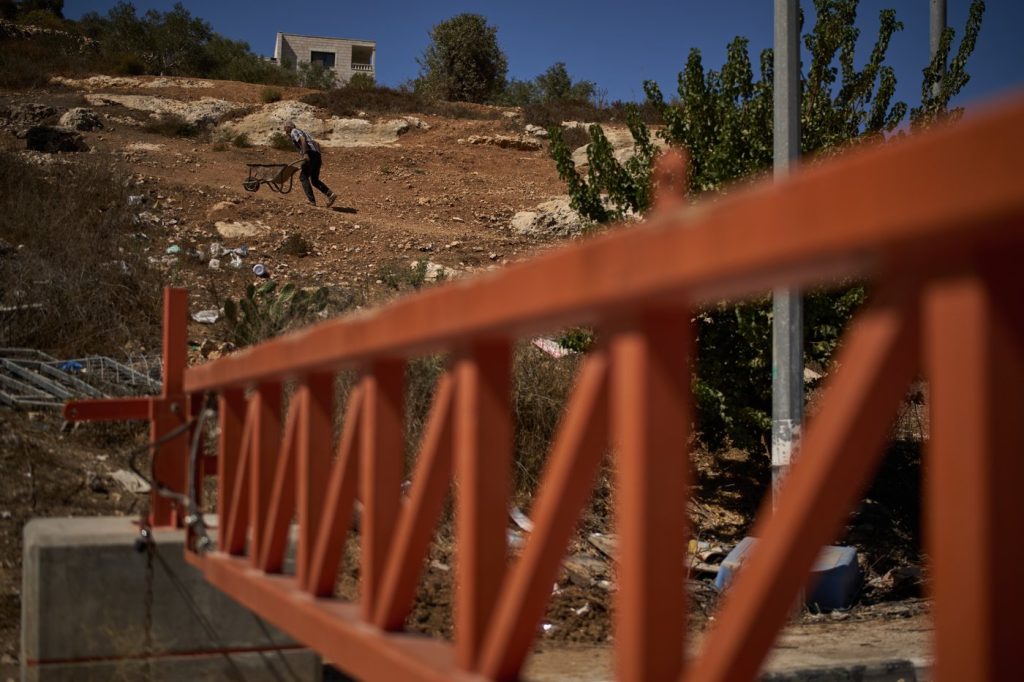SINJIL, West Bank (AP) – Since the onset of the conflict with Hamas over two years ago, Israel has constructed nearly 1,000 barriers in cities and towns within the occupied West Bank. This extensive system of gates, walls, and barriers has significantly restricted Palestinian movement and severely disrupted their daily lives, as reported by a local governmental body.
The Wall and Settlement Resistance Commission, an official Palestinian governmental entity, highlighted that a total of 916 barriers have been erected following the October 7, 2023, Hamas-led attack on Israel. Locals emphasize that the sheer number of new barriers marks an unprecedented level of restrictions, exacerbating existing limitations already imposed by the Israeli military since it captured the West Bank during the 1967 Mideast war.
The new barriers include metal gates that have been placed at numerous village and town entrances as well as between cities, significantly obstructing access in and out of these areas. In many instances, Israeli military personnel are stationed at these gates, which are reported to have inconsistent opening hours. Some gates can remain closed for days at a time, forcing people to seek alternative routes or stay overnight with friends or relatives.
During the initial two weeks of September, the United Nations documented the installation of 18 new gates throughout the West Bank. These gates, along with other obstacles such as large earth mounds and concrete blocks, hinder Palestinians' freedom of movement, impacting their access to essential services such as healthcare and education. Vehicles are often unable to circumvent these barriers, as some are positioned directly in the middle of roads.
The newly installed gates, particularly those obstructing roads that connect northern and southern areas of the West Bank, have forced the territory's approximately 3 million Palestinians to take lengthy detours. A journey that once took around 20 minutes can now extend to over an hour, further complicating daily activities.
Israeli military officials have characterized the gates as measures intended to manage and monitor movement rather than to restrict the populace. An anonymous military official stated that the security situation in the West Bank is complex, claiming that militants often conceal themselves within civilian populations, necessitating the use of "dynamic checkpoints" and ongoing monitoring efforts.
Residents have noted that some of the gates are equipped with surveillance cameras. They express heightened concerns about the barriers' detrimental effects on their livelihoods. Ezzedine Al-Sayouri from Deir Dibwan village stated, "Under the current circumstances, everything has been cut off. Everything has stopped," reflecting on how the closures have adversely affected his gym business and leading him to contemplate leaving the area.
In the village of Aboud, locals report that entry gates are closed daily between 6 a.m. and 9 a.m., resulting in students missing classes and workers being unable to commute. Mohammad Shalatweh, a taxi driver, described this as part of the "occupation's strategy to destabilize the people's sense of security." The pervasive uncertainty regarding movement has left many residents feeling anxious and vulnerable.
Concerns are also raised around personal safety due to the additional barriers. Eyad Jameel, a restaurant owner from Sinjil, expressed apprehension each time his son travels to the city of Ramallah, voicing his fear that the gates might not open, potentially trapping individuals and complicating their return home.











